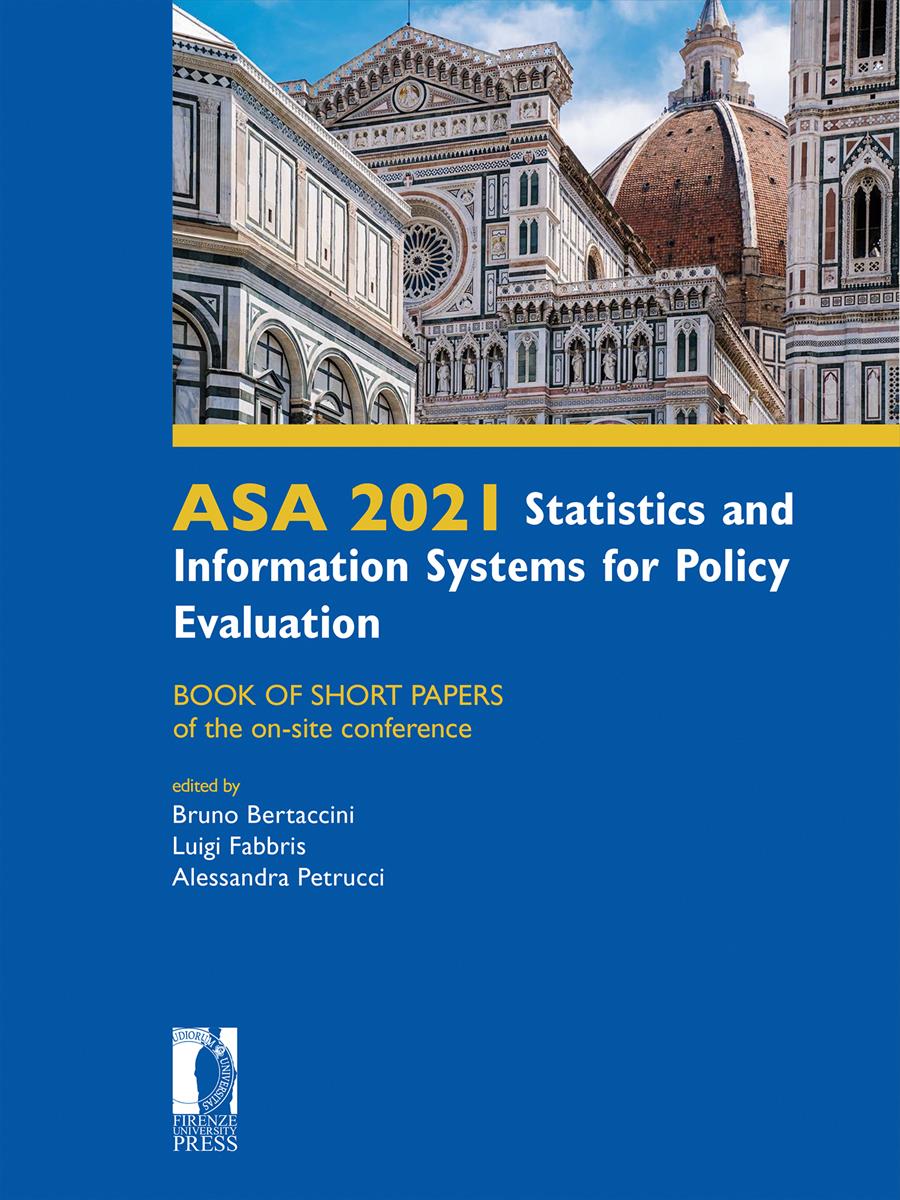- ASA 2021 Statistics and Information Systems for Policy Evaluation
- Edited by Bruno Bertaccini, Luigi Fabbris, Alessandra Petrucci
Media and fake news: An analysis of citizens’ attitudes toward misinformation in European countries
- Mauro Ferrante
- Anna Maria Parroco
- © 2021 Author(s) |
- CC BY 4.0
- DOI: 10.36253/978-88-5518-461-8.35
The rapid changes determined by the rise of Internet and the recent development of social media in daily life have led to profound consequences on the quantity and quality of data made available and on the mechanisms of their dissemination. The rapid spread of on-line disinformation is one of the most discussed topic, and has been identified as one of the top-trends in modern societies by the World Economic Forum, also because of the link between these processes and political communication. Thanks to the availability of micro-data from the Flash Eurobarometer survey on “Fake news and disinformation online”, the present work aims at analyzing the attitude of European citizens toward fake news and disinformation. In a first step, cluster of citizens are identified according to their level of trust in media news, in relation to different types of media. Given the categorical nature of the variables considered, k-mode clustering is implemented. Secondly, the main determinants of news trust levels are analyzed, through regression models for categorical response variables. Preliminary results show that socio-demographic characteristics as well as technological use have an influence on trust in the media, which in turn determines different approaches on the role of institutions in tackling disinformation. The relevance of fake news in contemporary period and its potential consequences on the political side require a reflection on the role of statistical literacy and of official statistical institutes in dealing with disinformation in the post-truth era.
- Keywords:
- Disinformation,
- Eurobarometer,
- k-mode,
- Consumer attitude,
- Trust,
University of Palermo, Italy - ORCID: 0000-0003-1287-5851
University of Palermo, Italy - ORCID: 0000-0003-3213-7805
- Allcott, H., & Gentzow, M. (2017). Social media and fake news in the 2016 election. Journal of economic perspectives, 31(2), pp. 211-36.
- Baldacci, E. & Pelagalli, F. (2017). Communication of statistics in post-truth society: the good, the bad and the ugly. Luxemburg: Publications Office of the European Union. KS-TC-17-005, 2017.
- Borges‐Tiago, T., Tiago, F., Silva, O., Guaita Martinez, J. M., & Botella‐Carrubi, D. (2020). Online users' attitudes toward fake news: Implications for brand management. Psychology & Marketing, 37(9), pp. 1171-1184.
- Dinev, T., Goo, J., Hu, Q., & Nam, K. (2009). User behaviour towards protective information technologies: the role of national cultural differences. Information Systems Journal, 19(4), 391-412.
- Dentith, M. R. (2016). The problem of fake news. Public Reason, 8(1-2), pp. 65-79.
- European Commission (2018) Fake news and disinformation online. Flash Eurobarometer 464. Document available at: https://op.europa.eu/it/publication-detail/-/publication/2d79b85a-4cea-11e8-be1d-01aa75ed71a1/language-en [last accessed 07/2021]
- Figueira, Á., & Oliveira, L. (2017). The current state of fake news: challenges and opportunities. Procedia Computer Science, 121, pp. 817-825.
- Fletcher, R., Cornia, A., Graves, L., & Nielsen, R. K. (2018). Measuring the reach of “fake news” and online disinformation in Europe. Australasian Policing, 10(2), pp. 25-33.
- Kim, S., & Kim, S. (2020). The Crisis of public health and infodemic: Analyzing belief structure of fake news about COVID-19 pandemic. Sustainability, 12(23), 9904, pp.1-23.
- Martens, B., Aguiar, L., Gomez-Herrera, E., & Mueller-Langer, F. (2018). The digital transformation of news media and the rise of disinformation and fake news—an economic perspective. JRC Digit. Econ. Work. Pap, 2, 57.
- Quan-Haase, A., Williams, C., Kicevski, M., Elueze, I., & Wellman, B. (2018). Dividing the grey divide: Deconstructing myths about older adults’ online activities, skills, and attitudes. American Behavioral Scientist, 62(9), pp. 1207-1228.
- Reuter, C., Hartwig, K., Kirchner, J., & Schlegel, N. (2019). Fake news perception in Germany: A Representative Study of People's Attitudes and Approaches to Counteract Disinformation. Proceedings of the International Conference on Wirtschaftsinformatik, Siegen, Germany.
- Rose, J. (2020). To believe or not to believe: An epistemic exploration of fake news, truth, and the limits of knowing. Postdigital Science and Education, 2(1), pp. 202-216.
- Shao, C., Ciampaglia, G. L., Varol, O., Yang, K. C., Flammini, A., & Menczer, F. (2018). The spread of low-credibility content by social bots. Nature communications, 9(1), pp. 1-9.
Chapter Information
Chapter Title
Media and fake news: An analysis of citizens’ attitudes toward misinformation in European countries
Authors
Mauro Ferrante, Anna Maria Parroco
Language
English
DOI
10.36253/978-88-5518-461-8.35
Peer Reviewed
Publication Year
2021
Copyright Information
© 2021 Author(s)
Content License
Metadata License
Bibliographic Information
Book Title
ASA 2021 Statistics and Information Systems for Policy Evaluation
Book Subtitle
BOOK OF SHORT PAPERS of the on-site conference
Editors
Bruno Bertaccini, Luigi Fabbris, Alessandra Petrucci
Peer Reviewed
Publication Year
2021
Copyright Information
© 2021 Author(s)
Content License
Metadata License
Publisher Name
Firenze University Press
DOI
10.36253/978-88-5518-461-8
eISBN (pdf)
978-88-5518-461-8
eISBN (xml)
978-88-5518-462-5
Series Title
Proceedings e report
Series ISSN
2704-601X
Series E-ISSN
2704-5846
